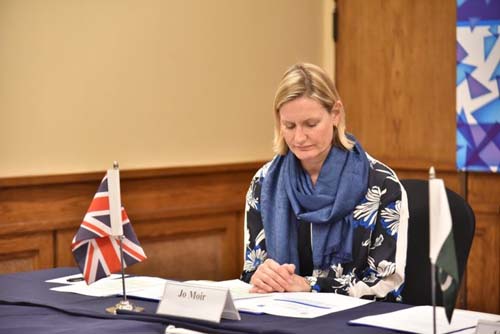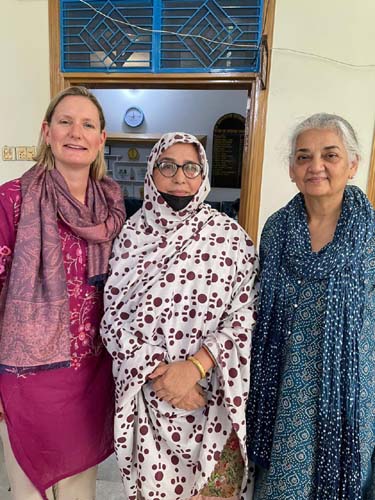Jo Moir lauds environmental commitment of King Charles

Celina Ali
Islamabad: Jo Moir, the Development Director for Pakistan at the British High Commission, has lauded the environmental commitment of King Charles III.
In an interview here, Moir also shared insights into the environmental commitment of King Charles’ son Prince William, who is also actively involved in environmental initiatives, including the Earth Shop Prize.
She said King Charles, Prince William and Princess Kate were all contributing significantly in the environment sector.
Moir said the British High Commission will celebrate King Charles birthday in Pakistan and also highlight his vision of a clean and green earth.

She maintained the United Kingdom was planning to significantly increase its development budget for Pakistan in the coming year.
The anticipated rise in funding is expected to reach around £ 130 million, a substantial increase from the current allocation of approximately £41.5 million.
Moir highlighted the intention to announce a substantial new program at the upcoming Conference of the Parties (COP) conference. The UK’s commitment to Pakistan’s development and climate resilience efforts was a focal point of the conversation. Moir stressed the UK’s support for Pakistan’s journey toward climate resilience and sustainable development.
She also addressed the climate challenges Pakistan faces, including devastating floods, which she attributed to the country’s vulnerability to climate change. Pakistan is ranked as the eighth most climate-vulnerable nation globally. The UK has been actively involved in responding to these challenges by working alongside the Pakistani government and partners to provide assistance.
In addition to emergency response efforts, Moir outlined various initiatives aimed at meeting the basic needs of affected communities, including emergency shelter, cash assistance, emergency education, and mobile health facilities. The UK’s assistance has reached approximately 1.5 million people, providing a total of 29 million pounds in humanitarian support and an additional 10 million pounds in support through its development portfolio.

Moir acknowledged the generous support from the British public, particularly the 1.6 million people of Pakistani heritage residing in the UK. She highlighted that the disaster emergency committee raised 48 million pounds for the Pakistan floods, demonstrating widespread concern and generosity.
Despite the substantial support provided, Moir recognized that the humanitarian assistance offered is only a fraction of what Pakistan needs to become climate-resilient. According to the World Bank, Pakistan requires an estimated $348 billion for climate resilience, adaptation, and transitioning to a green economy.
The interview also delved into the integration of innovative technology into climate programs, with examples of technology being used for early detection of forest fires and efficient irrigation in agriculture.
Regarding climate justice, Moir acknowledged that Pakistan contributes only 1% of global greenhouse gases but is disproportionately affected by climate change. She mentioned the UK’s support for initiatives like the Loss and Damage Fund and its aim to make progress in this area at COP28.
The interview concluded with discussions about the UK’s investments in education and family planning in Pakistan, amounting to approximately 900 million pounds over the past decade. Moir expressed the UK’s dedication to supporting Pakistan’s climate resilience efforts and the need for international collaboration, technological innovation, and financial investments to effectively combat climate change.
Nadeem Ahmed, the climate and energy attaché at the British High Commission, highlighted the importance of COP28 in addressing climate goals, climate finance goals, and the merging of efforts to protect nature and biodiversity with climate change initiatives. He emphasized the world’s recognition of the argument for climate justice and the evolving responsibilities among nations as defined by the Paris Agreement.





